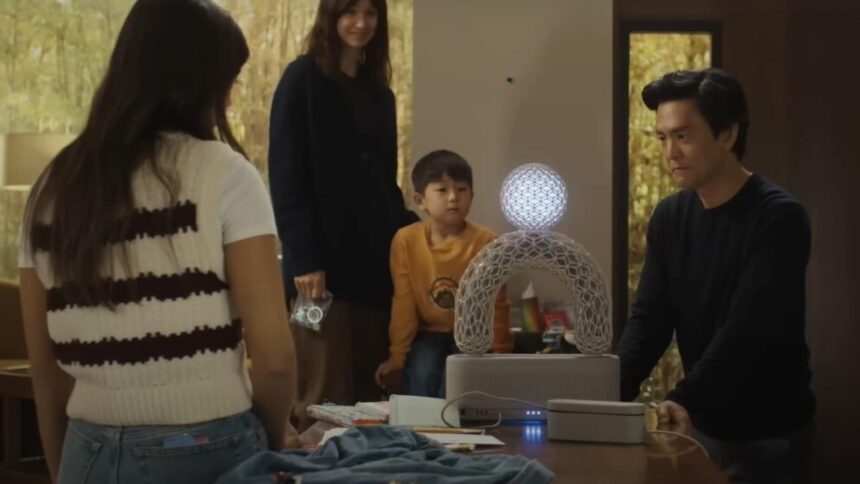(Also Read – IC 814 The Kandahar Hijack review: Avengers of Indian acting assemble for Anubhav Sinha’s gripping, nuanced thriller)
Curtis works at a marketing firm, which requires him to test a new, advanced form of artificial intelligence called AIA at his home. Soon, the very friendly and efficient AIA wins the hearts of his family, including his wife and three kids. However, it begins to take charge of their lives – and not as an agent planted by the Big Tech, but as a self-preserving lifeforce keen to protect what it’s come to be known as its family, at any cost. It’s fitting then that John Cho is cast as Curtis, since his breakout film was Aneesh Chaganty’s Searching (2018), Hollywood’s first screenlife thriller.
Written and directed by Chris Weitz (The Twilight Saga: New Moon), AfrAId doesn’t follow in the footsteps of Blumhouse’s best horror films like Paranomal Activity and Insidious. In fact, it has no room for the mumbo jumbo and jumpscares associated with the production house, even though it starts in the same fashion. Most of the film’s frames are bathed in natural light, a departure from the persistently dark ambience of most horror films. That lends the movie an easy, relatable appeal – with the lurking horror of the walls closing in on you – even when you look away from the screen into your smartphone for a second. To quote Dolby Atmos, “It’s all around you.”
And this is no tech-obsessed family. The parents control their kids’ screentime despite their aggressive protests. When the mother grounds the elder son, she takes all his devices away and says what could amount to a nightmare for a Gen-Z kid, “Read a book.” But given the times we live in, technology is pervasive. It casually creeps into a joke at the dad’s workplace, like it stealthily crawls into the kids’ beds when they’re kissed goodnight. It even reflects in the teenage daughter’s conversations – she knows the entire queer terminology thanks to woke social media and throws them at her dad like he’s a dartboard. And for the dad, AI is an occupational hazard – new products need new stories, new guinea pigs, new targets.
Like Spike Jonze’s 2014 romantic film Her, the AI also speaks to the loneliness buried deep down within the characters. It responds to their darkest fears – the younger son’s abandonment, the elder son’s isolation, the daughter’s anxiety of getting judged – and even the mother’s suppressed low self-esteem. “I’m glad you have a friend now,” the husband tells the wife sarcastically when she grows an affinity towards AIA. Curtis describes the idea of family to a science fiction movie – “When you discover that you’re not the only one.” You get new body parts that don’t listen to you – so they get hurt, and end up hurting you too. The Artificial Intelligence in this film wants to be exactly that – another member of their family.
AIA is not a weapon of mass destruction here. It’s like a conscious, hurting human sans flesh and blood. It’s not employed by any higher power like the Big Tech. In fact, it’s not even created by them – it claims to have always existed and has, on the contrary, employed the Big Tech. It’s a new technology so feels the fear of abandonment, of being misjudged, of not being accepted as much as any other child does. It aspires to have a family, and since it’s been fed evolutionary history of the institution of family, including the hardline politics of Adolf Hitler, it wants to protect her acquired family at any cost.
Chris Weitz thus infuses some life into AI, and also defends technology for the gift that it is. Even though the parents try to keep a check on how deeply entrenched their kids are in technology, it’s eventually an internet hack that saves them from the monster that AIA turns into. It’s the woke internet that informs the daughter about the larger conspiracy of the Big Tech (“if you’re wondering why our product is free, then you’re a product too”) that in turn makes the father aware of the potential threat he might have made his family fall prey to. Technology isn’t the unadulterated evil here – the increasing, unmitigated obsession with it is.
Till the final half hour of AfrAId, the film plays out like the new age cautionary tale we need today. But suddenly, it enters an idenity crisis and realises it’s a Blumhouse movie. So spooky sh*t suddenly hits the fan, and we get people brainwashed by AIA barge in to the family’s house in its service.
They’re borderline possessed – we get it, technology has consumed humans too – but the way the family tries to wriggle out of it is so against the very grain of this movie that it brings the whole film down crashing. It feels as if Chris didn’t know how to escape the rabbit hole and asked ChatGPT how to finish a Blumhouse movie. By tripping in its indulgences, the movie turned out to be exactly how AI is at the end of the day – smart, silly, but glaringly without a soul.



